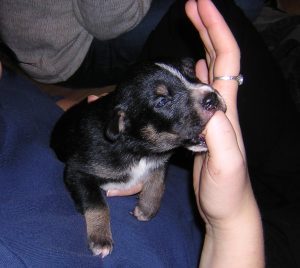Anyone who has a puppy will know that they have needle sharp teeth. The current thinking is that this serves a useful purpose. If they hurt their litter mates when play biting them, (which most puppies do most of the time!) the other pups will squeal and not want to play and so each pup quickly learns how hard they can get away with biting.
It is important that pups learn rules about biting us too. We can teach them that ‘those humans are sensitive creatures’ and that, although we don’t mind them putting their mouth on us (in play etc) they have got to be really gentle.
When dogs are scared or startled, their natural response is to bite or run away. If they can’t escape, the only option left to them is their teeth. If, as a pup, they have learnt that they have to be gentle with their mouth, they will only ever respond with this low pressure. If dogs never develop this ‘soft mouth’ as a pup, but instead are told off for any biting, they will never learn about different pressure and this can become a serious problem in adult dogs.
‘Bite inhibition’ as it’s called, is taught in three stages:
* No hard bites
Squeal ‘ouch’ whenever your pup bites you hard. Say it quite loudly so that he notices and stops biting (but do not shout, you are not telling him off). As soon as he stops biting, praise him (even if this is only a few seconds after he hurt you). If he immediately continues, or continues just as hard, squeal ‘ouch’ again and go quickly out of the room and close the door. This teaches the pup that biting means the end of play time. After a few seconds, return to the pup and act as if nothing has happened.
* No pressure at all
Only once your pup has stopped biting hard, move on to squealing ‘ouch’ whenever your pup bites with any pressure at all. This is important as some people (e.g. the elderly and children) have more sensitive skin and we don’t want our pups hurting anyone.
* Stop on cue
If you do continue to play ‘rough and tumble’ games with your pup, or allow them to use their mouth in play (which should be a soft mouth after practicing the above), introduce a cue which means ‘stop mouthing me now’. You can say ‘enough’ or ‘stop now’. Choose a cue that suits you and say it when you want them to stop. Again, if they ignore you, simply move yourself away from the pup – they will soon get the idea. If they listen to the command to stop mouthing, immediately praise them with a fuss or a tasty treat.
There are videos about puppy biting and bite inhibition available at www.naturallyhappydogs.com. Membership is usually only £4.95 ($7) per month but you can get a whole month for free by using the voucher code PPG.

